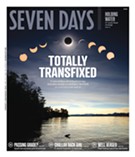Published May 10, 2006 at 4:00 a.m.
The Middle East: It's hard to imagine a place more frequently in the news and less understood by most Americans. Yet the fate of that troubled region is inextricably linked with our own, and not only because of the war in Iraq. So if you find a couple of experts in your neighborhood, why not put them together, eavesdrop on their conversation, and learn something?
That's why Seven Days asked Gordon Robison, a Shelburne-based journalist and former Baghdad bureau chief for Fox News, to sit down with fellow Mideast expert Greg Gause. An associate professor of political science at the University of Vermont and director of its Middle East Studies Program, Gause has written two books and many articles on the politics of the Arabian Peninsula and Persian Gulf area. Both men are members of Gulf2000, a mailing list/discussion group for Mideast specialists.
What follows are highlights of a talk between two Vermonters who spend most of their time thinking about a distant part of the world.
******
GORDON ROBISON: Why don't we start with Iraq? I find it very hard, when I look at Iraq in the short to medium term, to be optimistic. There were indications last summer that things were beginning to improve. But a lot of that has been undone, particularly by the failure of Iraq's politicians to agree on a prime minister for four months.
GREGORY GAUSE: And I think the increasing evidence is that there's sectarian and ethnic cleansing going on in the country. Maybe this isn't anyone's huge plan, but we're just seeing the mixed neighborhoods in Baghdad starting to go all one way or another.
GR: In retrospect, do you think that was inevitable? When I talk to my Iraqi friends - Sunni, Shia and Kurd alike - the sort of "official" line in conversation with foreigners is always, "None of these sectarian splits existed until you guys showed up." And I've got to say, I didn't spend any time in Iraq under Saddam, but I don't really buy that.
GG: Yeah, I don't buy that, either. Read Iraqi history. I mean, the Kurdish issue has bedeviled Iraq as a state since it was formed. And the Sunni-Shia stuff? We know that the Shia ayatollahs basically decamped into Iran after the creation of the Iraqi state because they were mad that the Sunnis were given power by the British.
GR: What do you think of the new Prime Minister, Jawad Al-Maliki? Talking with Iraqi friends, I was surprised at how well-received he seems to be.
GG: I don't know Maliki at all. I just know his CV, his background. Like all these guys, he's an exile. He was in Syria for almost 20 years. Left the country in '79, like a lot of the Shia did. His reputation is as an enforcer, but that was when he was down lower on the totem poll, and maybe that reputation for toughness will serve him well.
GR: I think there's a sense in which "tough" is, for better or worse, what a lot of Iraqis are looking for.
GG: Yeah, and it's what the situation calls for, for heaven's sakes. You have to have somebody who can make decisions, and can enforce them, and is willing to use what instruments he has to see that they're enforced.
GR: A lot of people here in the States think this was all about oil. Yet Iraq is producing even less oil now than it was under Saddam. Is Iraq the reason why gas costs $3 a gallon, or more?
GG: I was just at an energy conference down at Princeton. Some people from the oil industry were there, and I asked them how much of the $70 a barrel price we're seeing now is political fear. They said between $10 and $20. Of course, it's not just Iraq. There's a growing problem in Nigeria, a major oil producer. There's the Iran-American-Israeli tensions over the Iranian nuclear program. The instability in Venezuela. Lots of major oil producers have real political problems, and we're at a point where there's no spare capacity in the system.
GR: It's fear of shortage as opposed to actual shortage.
GG: Yeah, that's it. Physically, there's more than enough oil to run every refinery we have in the world right now. But there is fear that, maybe down the line, there'll be a shortage. Before we leave oil: How important do you think oil was in the overall American thinking to go into this war?
GR: Every time I give a talk somebody asks me: "Wasn't this all really about oil?" Well, was it about oil? Was it because Saddam tried to kill President Bush's father? Was it a feeling that there was unfinished business from 1991? Was it to protect Israel? Was it to assert American supremacy and stare down the rest of the world?
The answer is, it was all of those things and none of those things. One man - the president - gives the order that sends troops into battle, but the president sits atop this gigantic bureaucracy that feeds policy proposals up the line for a variety of reasons. So, in some sense, was it about oil? Maybe, to some extent, yes. But I don't think you can take something as big as a war, any war, and boil it down to just one thing.
GG: When I think about the role of oil in this war, I always start by saying, "What do you mean by oil?" Do you mean a Michael Moore kind of explanation where we fought so ExxonMobil could have these reserves rather than BP or Shell? I see no evidence of that at all. To me, in the end, if there's no 9/11, there's no Iraq war; 9/11 really is the thing that changes the political climate and changes the decision-makers' focus to get this war.
GR: Are we about to have a war with Iran? If you'd asked me six months ago I'd have said absolutely not. Today I still lean against it, but I'm no longer quite so sure.
GG: I actually think there's a logic of confrontation here that's pretty compelling. I tend to believe the Bush administration when they talk, at least about war. About other things, maybe not. But when the president says it's intolerable for Iran to have the capability to create a nuclear weapon, I take him at his word. Now, we could argue about whether that's a good idea or a bad idea, to set those kinds of absolute red lines. But this administration is pretty clear that they set red lines and they're serious about enforcing them.
GR: Why do you think we are so bothered by the idea of the Iranians having a nuclear weapon? Is it a) because we think Iran is run by crazy people? Or is it b) because we don't necessarily think the Iranians are crazy, but we fear the arms race an Iranian nuke will touch off? If the Iranians get one, then the Saudis will want one. Then the Egyptians will want one, and so on and so on.
GG: I think that we sell "a" - that they're crazy - but that the government worries about "b," about a nuclear arms race in the region. Think of the consequences in the oil markets if just one nuclear weapon is detonated anywhere near the Gulf.
GR: Let's move on to the Israeli-Palestinian conflict. You always have this sense with the Israelis and the Palestinians that, however bad it is, and you think it can't get worse, one side or the other manages to do something that . . .
GG: . . . makes it worse. If we have a low-level civil war in Iraq, which we do, we're seeing the beginnings of a potential low-level war among the Palestinians. You have all these Fatah [Palestinian Authority President Mahmoud Abbas' political party] guys with guns, and now Hamas has taken over the government. Add to that the fact that the economic situation in the West Bank and Gaza, already horrible, is going to get worse, because there's not going to be much aid going in. I don't see anything changing.
I think the last Israeli elections basically showed that the vast majority of the Israeli electorate is in favor of unilateral separation. Build the wall. Keep the main settlements. Give the Palestinians the rest. But don't negotiate with them. What it means is that the tensions within the Palestinian community, and the suffering and the economic hardship, are just going to increase. It will blow up, but how? I don't know. But the prospect of any change in direction right now, I think, is very, very slim.
GR: In the meantime, the international community has cast Hamas into the outer darkness. Even the other Arabs aren't very happy about the Hamas victory in January's elections.
GG: The Egyptians, the Jordanians, the Saudis, the Syrians, none of these Arab states is particularly interested in seeing Islamist groups come to power through elections, because they turn around and say, "We're gonna be next." If you're going to open up these societies to free elections - which gets us to the Bush doctrine and democratizing the Middle East - Islamists are going to win.
GR: And is that something we ought to be comfortable with here in America? The president says he's all for freedom and democracy, and that democracy is the natural aspiration of all people throughout the world. But I think it's naïve to suppose that people will always go out and elect the sort of governments we want them to elect. Are we as a society willing to live with the results?
GG: It's obvious that they're not willing to live with the consequences in the Palestinian Authority. No one contends that Hamas stole this election. This was a free and fair election. Hamas won, and we're closing them down. Now, I'm not against closing them down. Because we have an interest in Arab-Israeli peace, and we have this interest in Israel that's kind of a bedrock American interest, and Hamas will just not play ball with that. But this is the real conundrum. I think that people in the Arab world would love to have democracy. Every single poll shows it. I'm not saying that they can't, or that it would be a disaster, or that Islamists can't govern, or anything like that. But I know that Islamist governments will not be as friendly to the United States as the current authoritarian incumbents are.
GR: So, it is possible, looking at the region, to be hopeful?
GG: If there's some ray of hope in the region - and I don't think it's a big one - it's that this flood of money into the region [as a result of high oil prices] could help spur some real economic growth and development in places like Syria or Jordan or Egypt. You've got real entrepreneurial skill in a place like Syria, and a government that's just crushed it for decades. Will this new wave of capital lead to some freeing up of the Syrian economy? Some more freeing up of the Egyptian economy? Maybe. If there's one little hopeful strand I see in the region, that would be it.
More By This Author
Speaking of...
-

During a Previous Explosion of Mideast Bloodshed, a Journalist and His Family Straddled the Divide
Nov 1, 2023 -

Video: Musicians Jeremiah and Annemieke McLane Move into their New Home
Mar 24, 2022 -

Creating Art That Celebrates the Culture and Climate of Places Around the Globe
Jun 29, 2021 -

Video: Storyteller Ferene Paris Meyer Inspires a Juneteenth Mural
Jun 17, 2021 -

Arts and Culture Nonprofits to Receive $5 Million in State Relief Grants
Jul 7, 2020 - More »
Comments
Comments are closed.
From 2014-2020, Seven Days allowed readers to comment on all stories posted on our website. While we've appreciated the suggestions and insights, right now Seven Days is prioritizing our core mission — producing high-quality, responsible local journalism — over moderating online debates between readers.
To criticize, correct or praise our reporting, please send us a letter to the editor or send us a tip. We’ll check it out and report the results.
Online comments may return when we have better tech tools for managing them. Thanks for reading.









































